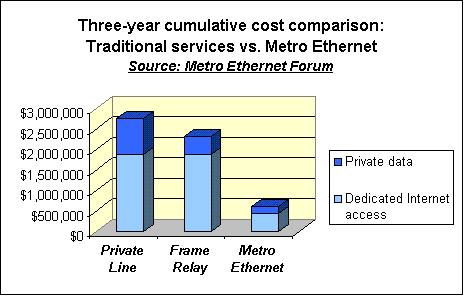Metro Ethernet Forum Pipes Up
This group's pushing hard for non-RPR Ethernet in carrier networks. Can it work? UPDATED 5/14 1:30 PM
May 13, 2002

So what's up with the Metro Ethernet Forum?
The organization issued a progress report today (May 13) touting the efforts of its 77 members, including several key carriers (see Metro Ethernet Forum Grows). At the upcoming Supercomm 2002 trade show, the group plans to conduct information sessions and present a new study on the business case for metro Ethernet.
But with critics lurking in the shadows and metro Ethernet efforts suffering some major setbacks recently, questions about the future of metro Ethernet are proliferating.
To start at the top: The Metro Ethernet Forum's goal is to define how technologies created for metro Ethernet can be used to create carrier services (see Metro Multiservices Evolution, page 6). For instance, after a meeting in April in New Orleans, the group finalized a draft spec for creating protection and recovery in Ethernet services -- one that offers the equivalent of Sonet/SDH's 50ms recovery time.
Originally, the group indicated its protection scheme was simpler than that proposed by the Resilient Packet Ring Alliance (see RPR in the Spotlight and MPLS Spurs Metro Ethernet Debate). Now, however, the Forum has backed off this claim, insisting that its goals are complementary to RPR.
The MEF has also created an outline of what's needed to configure, manage, and test metro Ethernet services and to apply quality-of-service functionality to them. The group has itemized what must be used to create point-to-point and point-to-multipoint Ethernet connectivity in virtual private networks.
But so far this is a roadmap and nothing more. The Forum's specs are in effect a detailed description of what is needed to create metro Ethernet services. It still needs to hammer out the specifics of how today's technologies, such as Multiprotocol Label Switching (MPLS), can be used to make it happen.
The membership roster now includes carriers BellSouth Corp. (NYSE: BLS), France Telecom SA, NTT Communications Corp., SBC Communications (NYSE: SBC), and Sprint Corp. (NYSE: FON). The recent addition of RBOC software supplier Telcordia Technologies Inc. is a sign of ongoing interest by key players, MEF sources assert.
The Metro Ethernet Forum says a growing demand for Ethernet services augurs enormous opportunities for the future. Recent reports commissioned by the forum and members such as Nortel Networks Corp. (NYSE/Toronto: NT) indicate that Ethernet offers considerable savings over traditional business networks by simplifying management and configuration. Not everyone agrees with the Forum's point of view, and some question whether it can, in fact, succeed.
Not everyone agrees with the Forum's point of view, and some question whether it can, in fact, succeed.
"Metro Ethernet is extremely overhyped," says Roderick S. Beck, an independent consultant who works with Cwell Associates (no Website). "The market just isn't there yet." He says the Forum's study was flawed because it used a model for private line services that "no manager in their right mind" would use -- a fully meshed private line model. The model stacked the deck, he says, and made the cost comparisons suspect.
Beck also says the jury's out on whether metro Ethernet will indeed offer the best alternative to today's networks. Next-generation Sonet/SDH techniques are appearing that significantly cut operating costs while making better use of Sonet bandwidth, he asserts. Most importantly, the lack of fiber from metro rings to buildings remains a barrier to any kind of Ethernet services.
Other sources say carriers are intent on mining the capabilities of their existing circuits, so many are putting off implementing the packet-based gear that's needed for Ethernet services. The Forum is challenged to succeed in this atmosphere.
The Forum also lacks a broad base of carrier support. Among the missing are Cogent Communications Inc., Qwest Communications International Inc. (NYSE: Q), and Verizon Communications Inc. (NYSE: VZ). Even some strategic partners of Atrica Inc. (a founding member) -- Sweden's Telia AB, Israel's Bezeq, and Telecom Italia -- have opted not to join. With annual dues at $15,000, the fee can hardly be the reason these companies aren't represented.
"The Forum is largely populated by equipment vendors," said a Qwest spokesperson, when asked about that carrier's absence from the Forum's roster. "We've simply opted to pursue its progress through our suppliers."
The Forum doesn't see itself this way, and neither do its carrier members. "SBC is dedicated to the objectives of the MEF," says a spokesperson for that member carrier. While SBC has a point-to-point Ethernet service now, it is using the Forum to study "the potential of a switched service." To that end, the carrier has dedicated personnel to the MEF tasks, including VP of broadband infrastructure and services Ralph Ballart, who serves on the board.
Whether the Metro Ethernet Forum builds credibility depends heavily on how well it can build a constituency among other carriers. Clearly, it needs their help to build momentum. It's safe to say a blow has been struck for progress. Whether the progress continues depends on the support the group gets for making its plans a reality.
— Mary Jander, Senior Editor, Light Reading
http://www.lightreading.comFor more information on Supercomm 2002, pleasevisit: SupercommSpecial
You May Also Like


.jpg?width=300&auto=webp&quality=80&disable=upscale)







